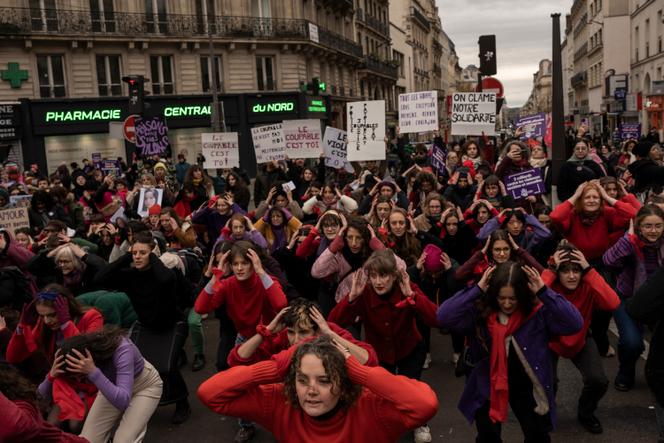


From Marseille to Paris, they are calling for a "jolt" and a "comprehensive framework law." Over 400 hundred organizations and figures called for demonstrations on Saturday, November 23, against violence (sexual, physical, psychological and economic) against women. These actions come on the heels of the shockwave caused by the extraordinary mass rape trial in southern France, in which some 50 men are accused of raping Gisèle Pelicot while she was unconscious, drugged without her knowledge by her husband.
According to the police, 1,500 people braved the rain in Rennes, and almost a thousand in Lille. In Bordeaux, 1,600 people demonstrated, according to the prefecture, and 3,000 according to the organizers.
In Marseille at midday, some 800 people, according to the Police Prefecture, gathered on the Old Port to denounce sexist and sexual violence. Signs brandished by the demonstrators, many young in age, or placed on the ground read "Break the law of silence, shame is changing sides," "No means no" and "Educate your sons."
In Paris, organizers claimed 80,000 people attended. Among them, Beatriz Beloqui, wearing a purple bonnet knitted for the occasion by her mother, arrived at the Gare du Nord station with a dozen activists from to voice their "cry of alarm."
Beloqui, who has been coming to the #NousToutes marches every year since 2019 – always with the same optimism – hopes that the Pelicot rape trial will open the eyes of public authorities and "bring men out of their silence." "I hope that the condemnation will be commensurate and that it will be accompanied by a real political awakening," she said.
Before the departure of the Parisian procession, the crowd, already well-sized, silently parted. In the center, a performance was announced by the Le Bruit Qui Court group, which began a choreography under applause. "The guilty party is not me, nor my clothes, nor the place," chanted the dancers. "The culprit is you, it's the police, it's the state, society, the whole patriarchy."
Natacha, 26, came to the demonstration alone, but "with my anger and my rage." The rape trial in recent weeks has "increased her anger tenfold." This secondary school teacher, who tries to instill the notion of consent in her pupils through "simple, everyday actions," came to "show that we [women] are here, that we'll always be here and that we're not going to give up."
"To scare the masculinists" is the main reason Françoise Guichard joined the demonstration. "The levees have opened," said the woman who added that she is "appalled" by the rise in masculinist comments, particularly from the US since the election of Donald Trump. At 70, she's "afraid for the future," she said, recalling the echo of the 1978 rape trial in Aix-en-Provence, which led to a change in the law to better define rape. She hopes that the current trial will lead to further progress: "What more do they [men] need to react?" she asked.
This trial, with its international resonance, "shows that rape culture is rooted in society, as is violence against women," explained Amandine Cormier, of Grève Féministe, at a press conference in Paris on Wednesday. "Patriarchal violence takes place everywhere, in homes, workplaces, places of study, on the street, in transport, in care facilities."
The call for mobilization was signed by over 400 organizations (including Fondation des Femmes, Planning Familial and #NousToutes) and public figures (such as Angèle, Judith Godrèche and Vanessa Springora). Labor unions were also present.
"Successive governments have stepped up promises, but the means are derisory and decreasing. Political action is almost non-existent," deplored the signatories. In November 2017, President Emmanuel Macron had made equality between women and men a "major cause" of his term, with the fight "for the complete elimination of violence against women" as its "first pillar."
An emergency number, 39-19, for women victims of violence and those around them, was set up, as well as the "Serious Danger Telephone" system and anti-aggression bracelets. These measures have been hailed by women's rights associations, who nevertheless consider them insufficient, and are urging the president to change tack.
Recalling the president's support for actor Gérard Depardieu, accused of sexual assault, and the Sénat's adoption of a bill against gender transitions among minors, #NousToutes member Yéléna Mandengué on Saturday called for a "jolt." Mandengué said, "We are all concerned by gender violence."
"Today, we're very worried about the funding of associations, offices are being closed," lamented Sarah Durocher, president of Family Planning, at the same press conference on Wednesday.
The groups are calling for a total budget of €2.6 billion per year and an "integral framework law" to replace current legislation, which they deem "fragmented and incomplete."
"We've drawn up a list of 140 proposals to combat violence against women," stated Elsa Labouret, spokeswoman for the association Osez le Féminisme!, during the Paris march. Labouret deplored a lack of "political will" on the issue. Alongside her, activist Céline Piques denounced the government's "publicity announcements" in the run-up to November 25, while "behind the scenes, things aren't changing." "It's all smoke and mirrors," she said, explaining that the long-term demands made by associations over the years are not being taken into account.
The French junior minister for equality between women and men, Salima Saa, has promised "concrete and effective measures" for November 25. These measures will aim, among other things, to "improve outreach measures" for victims, particularly in rural areas, and to strengthen "the reception and care of victims" through "training for front-line players," she added.
Translation of an original article published in French on lemonde.fr; the publisher may only be liable for the French version.
